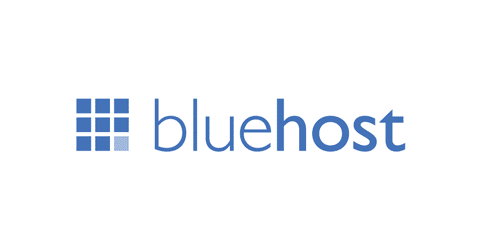Bluehost vs DreamHost – Which is Best to Buy in 2026?
- By: Muhammad Imad Ur Rehman
- Comparison, Web Hosting
- Fact Checked By: iblogO Team

Bluehost vs DreamHost
In the bustling world of web hosting, making the right choice can take time and effort, especially for beginners. You’ve likely heard of Bluehost and DreamHost, but which one is the right fit for you? In this clear-cut comparison of Bluehost vs DreamHost, we’re here to guide you through their offerings.
Bluehost, recommended by WordPress since 2003 and hosts over two million websites, offers a range of options from shared to VPS and dedicated hosting. DreamHost, hosting 1.5 million websites, offers versatile and affordable solutions. But beyond the numbers, what sets them apart?
We’re here to slice through the marketing buzz and bring you an honest, straightforward comparison. We’ve covered you, from pricing and plans to performance and customer support. We aim to empower you with all the facts – the pros and cons, the strengths and weaknesses – of Bluehost and DreamHost.
No fluff, just the essential information you need to make the best decision for your website. Let’s dive in and discover whether Bluehost or DreamHost completes your web hosting puzzle.
Bluehost vs DreamHost Overview
Core Features | Bluehost | DreamHost |
|---|---|---|
Starting Price  | ||
Free Domain  | ||
Specialized in  |
Manage WordPress Hosting |
WordPress Hosting |
Disk Space  |
10GB - 100GB |
50GB - Unlimited |
Monthly Traffic  |
Unmetered |
~100k to 1M Visitors |
Money Back Guarantee  |
30 days |
97 days |
Server Location  |
Orem, Utah, USA |
California, USA |
General Features | Bluehost | DreamHost |
|---|---|---|
Site Migrations | ||
Email |
Free Trial - $3/mo* |
$1.67/mo* |
WordPress Installation |
1 click |
1 click |
Staging Environment |
Free |
Free |
Websites |
1 - 5 |
1- Unlimited |
Bandwidth |
Unmetered |
Unmetered |
Customer Support | Bluehost | DreamHost |
|---|---|---|
Phone Support |
$9.95 | |
Live Chat |
24/7 |
24/7 |
Ticket Support | ||
Performance | Bluehost | DreamHost |
|---|---|---|
Uptime Guarantee |
99.9% |
100% |
Free CDN | ||
Avg Response Time |
639 ms |
426 ms |
Security | Bluehost | DreamHost |
|---|---|---|
Firewall DDoS Protection | ||
Free SSL Certificates | ||
Automatic Backups |
Daily |
Daily |
Malware Scanning |
CodeGuard |
DreamShield |
Hack Fix Guarantee | ||
WHOIS Domain Privacy |
Ease of use | Bluehost | DreamHost |
|---|---|---|
cPanel |
Control Panel |
Custom Built |
Users |
Unlimited |
Unlimited |
Optimization Tools | ||
PHP Versions |
Latest |
Latest |
Website Builder |
Bluehost Pricing & Hosting Types | All Packages (Monthly) |
|---|---|
Shared Hosting |
$2.75 - $9.95 |
Managed WordPress Hosting |
Same as shared |
Dedicated Server |
$89.98 - $139.99 |
VPS Hosting |
$29.99 - $69.99 |
WooCommerce Hosting |
$6.75 - $9.95 |
DreamHost Pricing & Hosting Types | All Packages (Monthly) |
|---|---|
Shared Hosting |
$4.95 - $8.95 |
Managed WordPress |
$4.95 - $79.95 |
VPS Hosting |
$15.00 - $120 |
Dedicated Server |
$169.00 |
Cloud Hosting |
$4.50 - $48.00 (Max) |
WooCommerce Hosting |
$19.95 - $79.95 |
Over all Winner
Bluehost Rating
Pros
- Affordable pricing
- User-friendly interface
- Dependable features
- Excellent WordPress hosting
- 24/7 customer support
Cons
- Limited Storage
- Poor backup service
- Overage renewal prices
Close Second
DreamHost Rating
Pros
- Efficient Setup
- Affordable Plans
- Good Performance
- Award-winning Support
- Flexible Payments
Cons
- cPanel Learning Curve
- Support Gaps
- Plan Limitations

Comparing Pricing and Plans
When choosing a web hosting service, pricing and the variety of plans are often the first things you’ll consider. Let’s compare what Bluehost and DreamHost offer, looking closely at their pricing structures and the diversity of their hosting plans.
Bluehost: A Range of Affordable Options
Bluehost’s Shared Hosting starts at a budget-friendly $2.75/month for the Basic plan. This plan is perfect for those running a single website or blog, offering 10 GB SSD storage, free CDN, SSL, and a free trial of a professional email. If you need more, Bluehost scales up to the Pro plan at $13.95/month, giving you 5 websites and 100 GB SSD storage.
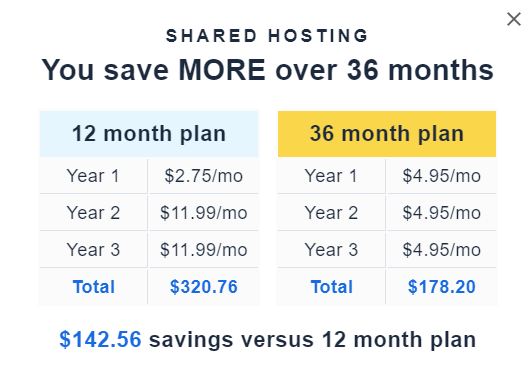
Bluehost’s Dedicated Hosting ranges from $89.98/month to $139.99/month, offering varying degrees of control and performance for those looking for dedicated resources.
VPS Hosting with Bluehost starts at $29.99/month, striking a balance between shared hosting and dedicated servers. This option is excellent for those needing more power and control.
For WordPress enthusiasts, Bluehost’s WordPress Hosting aligns with shared hosting pricing, providing an environment optimized for WordPress websites.
DreamHost: Simplified and Straightforward
DreamHost’s Shared Hosting shines with its affordability. The Shared Starter plan, ideal for beginners, is priced at a competitive $2.59/month. It covers the basics, including hosting for new sites and WordPress integration. The Shared Unlimited plan, at $3.95/month, expands on this by offering unlimited email accounts at your domain.
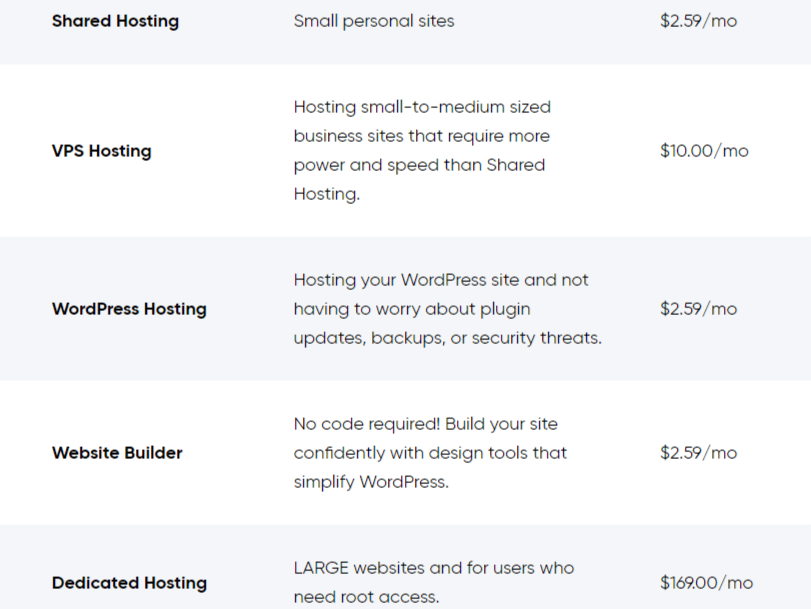
VPS Hosting with DreamHost offers a scalable solution starting from $10.00/month. It’s a fitting choice for businesses needing more resources.
DreamHost’s WordPress Hosting mirrors its shared hosting options in price, tailored for WordPress performance.
The Winner: DreamHost
When it comes down to sheer pricing and plan simplicity, DreamHost takes the lead. Its straightforward, no-nonsense pricing strategy, especially for shared and WordPress hosting, offers beginners and small business owners excellent value. The pricing is attractive at the entry level and remains competitive as you scale up.
Bluehost, while slightly higher in pricing, counters with a broader range of hosting options. It offers more tailored solutions, especially for those needing specific features like dedicated resources or optimized WordPress hosting. This makes Bluehost a versatile choice for a variety of needs.
Note:
If price and simplicity are your primary concerns, DreamHost is your go-to. However, for a broader range of options to suit different hosting needs, Bluehost stands out.
Bluehost vs DreamHost Features Comparison
When it comes to the features of web hosting services, every detail counts.
Bluehost’s offerings extend beyond just hosting solutions. They provide a range of specialized hosting types, including Shared, Dedicated, VPS, WordPress, and WooCommerce hosting. This diversity caters to various needs, from basic blogs to complex e-commerce sites.
Regarding disk space, Bluehost starts you off with 10 GB on its Basic plan, scaling up on higher-tier plans. When it comes to server locations, Bluehost has a global presence with servers in Orem, Utah, USA, the UK, and Asia, ensuring better load times across different geographies.
DreamHost, on the other hand, while less varied in hosting types, focuses on delivering quality within its Shared, VPS, Dedicated, and Cloud hosting services.
A standout feature of DreamHost is its impressive 97-day money-back guarantee, reflecting its confidence in service quality. DreamHost’s server location in California, USA, caters well to a US-based audience.
Bluehost and DreamHost offer user-friendly WordPress installations and staging environments when we talk about general features. DreamHost takes a slight edge by providing this feature even on its basic plans. In the arena of site migrations, Bluehost offers a paid service. At the same time, DreamHost simplifies the process with its automated WordPress migrations.
Email hosting is another battleground. Bluehost includes unlimited email accounts in its higher-tier plans, which can be a boon for growing businesses. In its Unlimited plan, DreamHost also provides email hosting, aligning with the needs of users who require professional email services.
The Winner: DreamHost
In this feature’s face-off, DreamHost takes the crown. Its comprehensive features, user-friendly approach and generous money-back guarantee make it a go-to option for those seeking a balance of functionality and ease of use.
Bluehost holds its ground with diverse hosting options and global server locations. Still, when it comes to an all-rounder with user-focused features, DreamHost leads the race.
Note:
Bandwidth is a non-issue with both, as they offer unmetered bandwidth across their plans, ensuring your site can handle traffic without hiccups.
Performance Analysis: Is Bluehost Faster than DreamHost?
In the head-to-head matchup of Bluehost vs DreamHost, speed and reliability are paramount for anyone relying on web hosting services.
Our investigation into whether Bluehost is faster than DreamHost involved a meticulous look at their uptime, server response time, and GTmetrix results.
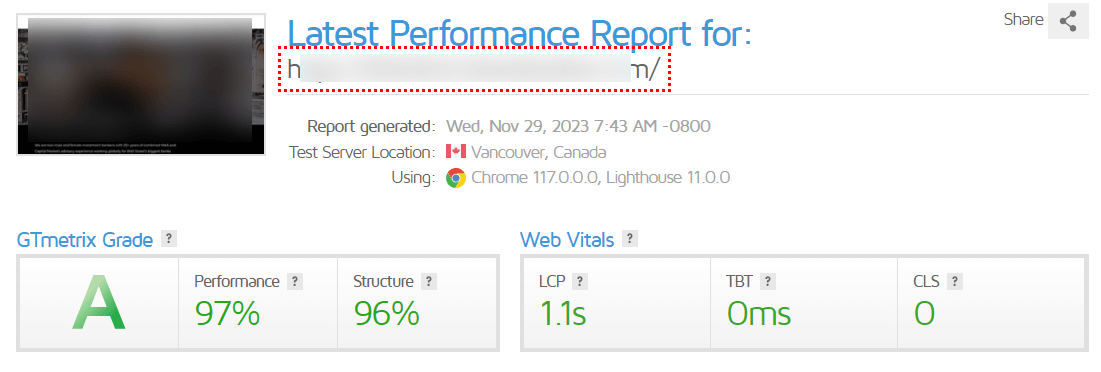
Bluehost impresses with its consistent uptime of 99.9%, ensuring that websites hosted on its platform are reliably accessible. Its server response time, which averages 361ms, demonstrates Bluehost’s commitment to efficiency.
However, DreamHost steps into the spotlight with a slightly better performance. DreamHost not only nearly meets its bold promise of 100% uptime, with an actual record of 99.99% uptime, but also surpasses Bluehost with a faster average server response time of 231ms, suggesting more responsive servers.
Our GTmetrix analysis shows Bluehost with a respectable Largest Contentful Paint (LCP) of 697ms and a total load time of 832ms.
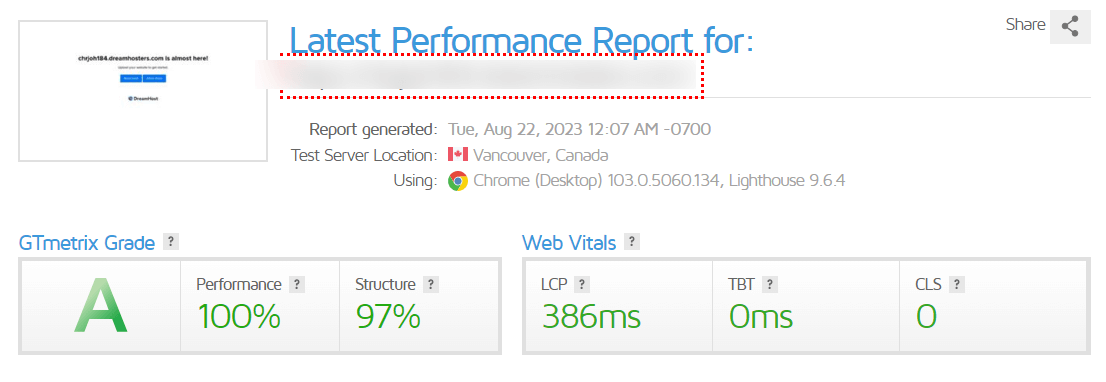
In comparison, DreamHost takes the lead with an LCP of just over 0.8 seconds and a total load time of 426ms, even when accessed from various global locations. These metrics, especially when combined with DreamHost’s perfect GTmetrix performance score, make it the superior choice for users who prioritize rapid and consistent performance in their web hosting.
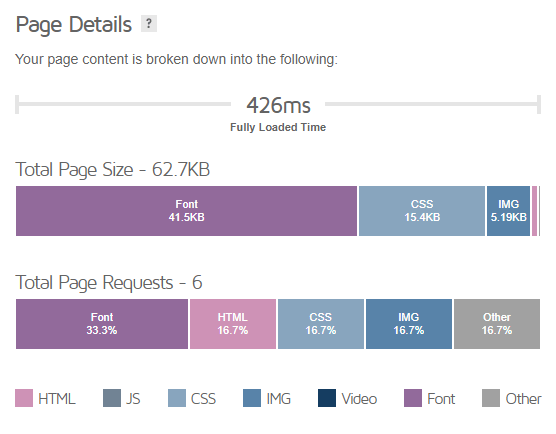
The Winner: DreamHost
After evaluating the performance data, the answer to “Is Bluehost Faster than DreamHost?” becomes clear. DreamHost edges out Bluehost in this critical aspect of web hosting. With its faster server response and outstanding GTmetrix performance, DreamHost is the go-to choice for users seeking a web hosting service that combines speed with unwavering reliability.
Bluehost vs DreamHost Security
When it comes to web hosting, the security of your website is non-negotiable. In the face-off between Bluehost vs DreamHost, each brings its unique strengths.
Bluehost and DreamHost use effective firewalls and DDoS protection to protect your site from common cyber threats. This level of security is fundamental to keeping your online presence safe and consistently accessible.
Essential for safeguarding data, both providers offer SSL certificates for free, adding a layer of encryption between your site and its visitors. This feature is particularly crucial for sites handling sensitive user data, such as online stores.
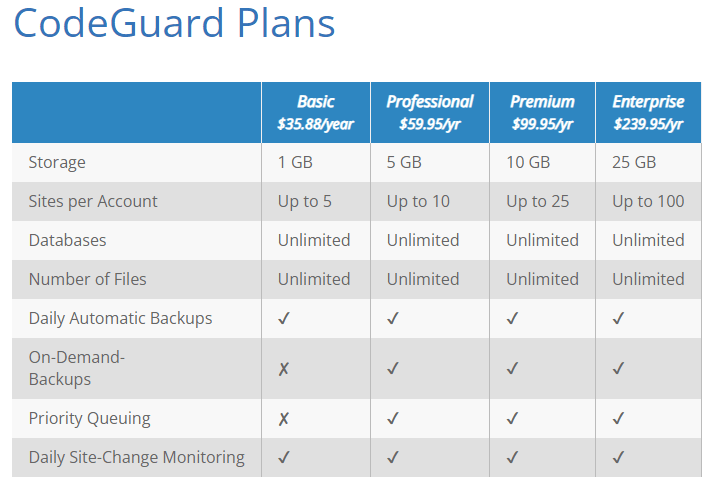
CodeGuard vs DreamShield: Comparing Bluehost’s CodeGuard and DreamHost’s DreamShield reveals a notable difference. While CodeGuard efficiently backs up your site, it’s an added expense. DreamShield offers backup solutions and extends to malware removal services, enhancing your site’s defense mechanisms at a similar additional cost.
DreamHost offers its DreamShield service, providing comprehensive virus eradication at $3/month. Bluehost’s partnership with SiteLock for malware scanning adds another layer of security but as a paid feature, affecting overall cost.

DreamHost stands out with a hack-fix guarantee, offering to repair your site if it falls victim to a security breach. This level of commitment to security provides peace of mind to website owners.
Both hosts offer WHOIS Domain Privacy, but DreamHost includes it complimentary in its plans. Bluehost, however, asks for a nominal $0.99/month, making DreamHost’s offering more appealing.
The Winner: DreamHost
In the Bluehost vs DreamHost security comparison, DreamHost emerges as the clear victor. Its comprehensive approach to security, offering crucial features like automated backups and domain privacy as part of the standard package, positions DreamHost as the more secure and value-driven choice for web hosting services.
Who is Better in terms of Customer Support, Bluehost or DreamHost?
When choosing a web hosting provider, customer support is a crucial factor that can significantly influence your overall experience. In the matchup of Bluehost vs DreamHost, we delve into their customer support offerings to see who excels in providing effective and responsive assistance.
Bluehost prides itself on offering round-the-clock support through various channels, including 24/7 live chat and phone support. Their commitment to customer service extends beyond fundamental hosting issues, covering areas like website design and optimization.

Bluehost’s live chat support is known for its prompt responses and knowledgeable staff, ensuring your queries are addressed efficiently.
DreamHost, on the other hand, presents a different approach to customer support. While they offer a 24/7 email ticketing system, their live chat support is limited to working hours only. DreamHost also provides a paid phone support option, making it less accessible than Bluehost for immediate, real-time assistance.

Their knowledge base is comprehensive, but when direct interaction is desired, DreamHost’s support channels might need to catch up in availability compared to Bluehost.
In terms of effectiveness, both Bluehost and DreamHost demonstrate a capable and knowledgeable support staff. However, Bluehost’s 24/7 live chat and phone support provide a more immediate and accessible avenue for resolving issues.
While DreamHost’s approach might be sufficient for some users, the limited hours for live chat and the additional cost for phone support can be a drawback for those seeking more direct and flexible support options.
The Winner: Bluehost
Evaluating the customer support of Bluehost vs DreamHost, Bluehost takes the lead with its 24/7 accessibility and diverse support channels. This availability is particularly beneficial for users who require immediate assistance at any time of the day.
While offering reliable support, DreamHost must have the same immediacy and convenience level in its customer support services.
User Interface and Ease of Use
In web hosting, ease of use is crucial, particularly for beginners. When evaluating Bluehost and DreamHost, their approaches to a user interface, control panels, and website builders are pivotal in determining which service offers a more seamless experience.
Bluehost shines with its beginner-friendly approach. The platform eases new users in with a dual-dashboard setup. The primary dashboard is straightforward, guiding you through domain configuration and site installations.
For more tech-savvy users or those looking to expand their skills, Bluehost offers the cPanel. This integration is a significant plus, as cPanel is known for its comprehensive yet user-friendly interface. It’s a perfect blend of simplicity and functionality, making it a strong contender for first-time website owners.
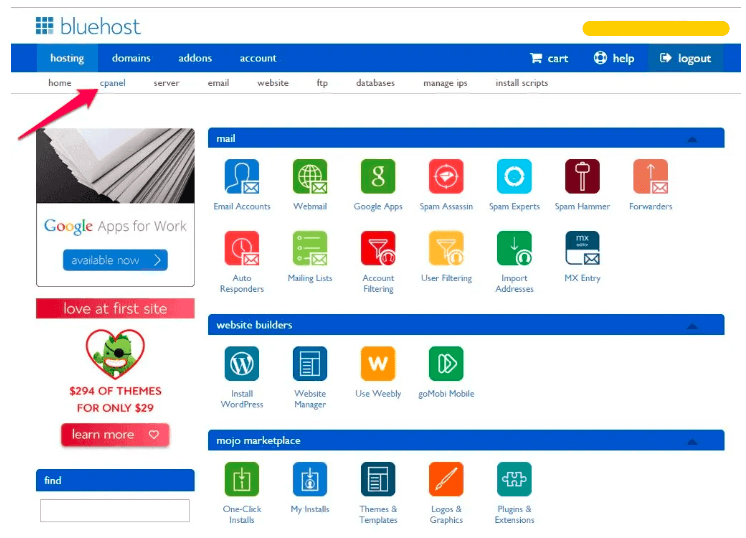
DreamHost also presents a concentrated dashboard, but it’s a bit more complex than Bluehost. While it includes all the necessary tools, new users might need time to get used to its layout and navigation.
DreamHost does not immediately present a ‘My Sites’ area like Bluehost, which might add to the initial learning curve. However, once you get the hang of it, DreamHost’s dashboard is an efficient and powerful tool.
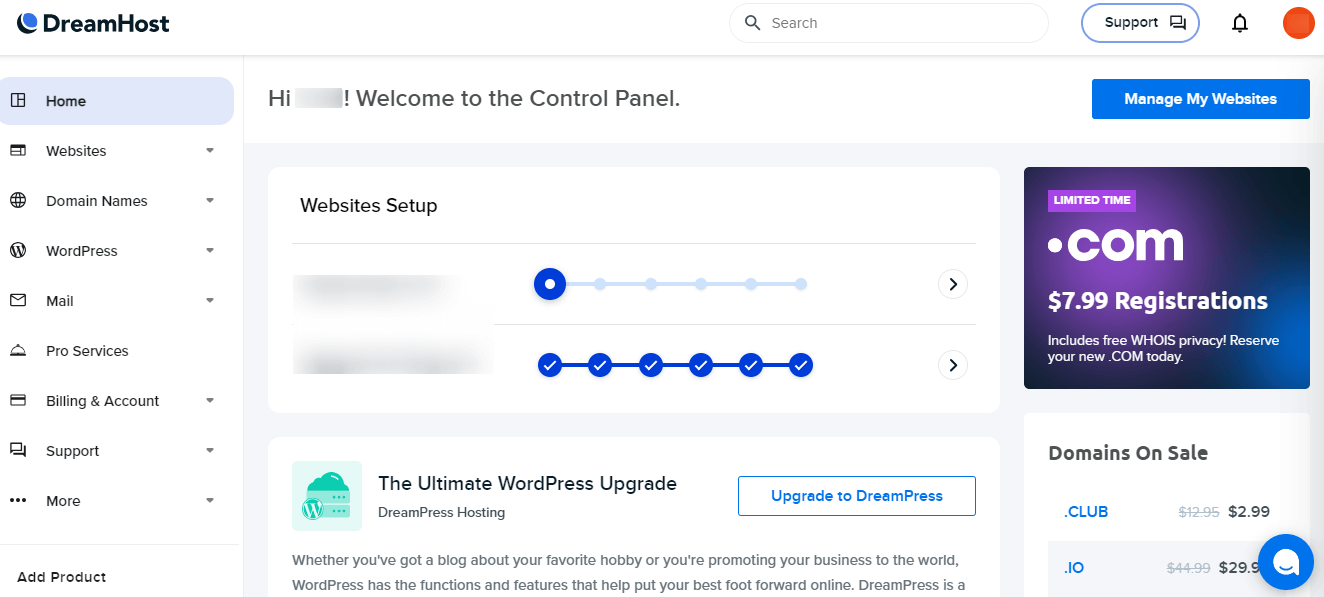
Website builders are another crucial aspect of user experience. Bluehost leads with its intuitive WordPress-based website builder and an invaluable staging tool. The staging environment allows you to make changes and test new features without affecting your live site. This feature is convenient for beginners still learning the ropes of website management.
DreamHost offers two website builders – BoldGrid and Remixer. BoldGrid is more suited for creating intricate WordPress sites, while Remixer caters to more straightforward, more basic website needs. However, the absence of a staging environment is a noticeable gap in DreamHost’s offerings.
Considering all these aspects, it’s evident that Bluehost offers a more streamlined and beginner-friendly experience. Its mix of a user-friendly interface, accessible cPanel, and helpful website-building tools makes it an ideal choice for newcomers to web hosting.
The Winner: Bluehost
In the Bluehost vs DreamHost ease-of-use battle, Bluehost emerges as the winner. Its approach to user interface, combined with the simplicity of its tools and resources, makes it the go-to choice for beginners and those who prioritize a hassle-free web hosting experience.
While powerful, DreamHost lacks the immediate ease of use that Bluehost provides, making it more suited for those with some experience under their belts.
Our Verdict: Is DreamHost Better Than Bluehost?
In this definitive verdict of Bluehost vs DreamHost, we have thoroughly scrutinized their services from various perspectives. Both hosting providers excel in their respective domains, making the choice a matter of specific needs and preferences.
Bluehost is ideal for those new to web hosting or managing small to medium-sized websites. Its user-friendly interface and 24/7 customer support make it a standout for beginners.
The integration of cPanel and additional tools like a WordPress-based website builder and staging environments further simplifies the hosting experience. This accessibility is a significant advantage for users seeking a straightforward, supportive hosting environment.
DreamHost distinguishes itself in performance and security. With consistent uptime and faster server response times, it caters well to content-heavy websites or those experiencing high traffic.
DreamHost’s comprehensive security features, including automated backups and domain privacy at no extra charge, provide robust protection for your website. This makes DreamHost an excellent option for those prioritizing performance and security, especially for users comfortable with a slightly more complex interface.
The Winner: BlueHost
After evaluating each aspect, Bluehost emerges as the overall winner. It’s the more user-friendly option, offering comprehensive features that cater to a broad user base, especially beginners and small to medium-sized businesses.
Its balance of functionality, ease of use, and customer support positions Bluehost as a top choice for a hassle-free hosting experience.
Note:
Pricing is a nuanced consideration. DreamHost offers slightly lower starting prices, but the overall value must be weighed against individual needs and each provider's specific features.
DreamHost is a close second, especially suitable for those needing enhanced performance and security who are okay with a bit of a learning curve or limited customer support hours.
Ultimately, your choice between Bluehost and DreamHost should align with your specific hosting needs, whether launching a personal project, an e-commerce site, or managing a bustling business website. Both platforms offer rich and reliable hosting solutions, but Bluehost’s all-around appeal secures its position as our top recommendation.
Best Alternatives to Bluehost and DreamHost
Here are some noteworthy alternatives if you’re still searching for the right hosting provider after exploring the Bluehost vs DreamHost comparison. Each host brings something unique to the table in the hosting market. Let’s quickly cover what they’re known for, leading you to our detailed reviews:
- WP Engine: Known for premium WordPress hosting. Read our Wp Engine review.
- Namecheap: Offers competitively priced domains and hosting services. Read our Namecheap review.
- GoDaddy: A giant in domain registration and comprehensive hosting solutions. Read our GoDaddy review.
- A2 Hosting: High-performance hosting with a focus on speed and reliability. Read our A2 Hosting review.
- Kinsta: Premium managed WordPress hosting for demanding websites. Read our detailed Kinsta review.
- InMotion Hosting: Balanced offerings with great support and reliability. Read our InMotion Hosting evaluation.
- HostGator: Popular for shared hosting with scalable options. Read our HostGator review.
- GreenGeeks: Eco-friendly hosting with a commitment to sustainability. Read our GreenGeeks review.
- TMD Hosting: Known for excellent customer service and diverse hosting plans. Read our TMD Hosting review.
- OVHCloud: Offers extensive cloud and web hosting services. Read our OVHCloud review.
- HostPapa: Small business-oriented with a range of easy-to-use tools. Read our HostPapa review.
- StableHost: Reliable hosting with an emphasis on stability. Visit our StableHost review.
- Cloudways: Cloud hosting management is made easy and efficient. Read our Cloudways review.
- Hostinger: Known for affordable hosting. Read our Hostinger review.
We’ve compiled two extensive lists for those considering a broader spectrum of options: Top 18 Bluehost Alternatives and Top 14 DreamHost Alternatives. These guides offer insights to help you choose the most suitable hosting service.
Additionally, check out our extensively researched article on the Best Web Hosting Providers – Reviewed and Tested for an all-encompassing view of the best hosting providers. This piece offers a consolidated view of top hosting services, enabling you to decide on your web hosting requirements.
FAQs of Bluehost vs DreamHost
What are the main differences between Bluehost and DreamHost?
The main differences lie in pricing, ease of use, performance, security, and customer support. Bluehost excels in user-friendliness and customer support, while DreamHost stands out for its performance and security features.
Are DreamHost and Bluehost the same company?
No, DreamHost and Bluehost are distinct entities. Bluehost is owned by Endurance International Group (EIG), while DreamHost remains independently owned.
Can I host an e-commerce website on Bluehost or DreamHost?
Yes, both Bluehost and DreamHost support e-commerce platforms and provide features suitable for running online stores.
Is Bluehost or DreamHost better for WordPress?
Both offer strong WordPress hosting, but Bluehost is officially recommended by WordPress.org, mainly for its ease of setup and comprehensive WordPress integration.
What is cheaper than Bluehost?
Hostinger, DreamHost, and Namecheap offer plans that can be more cost-effective than Bluehost, depending on the services and features you need.
What is better than DreamHost?
The answer depends on specific needs. For user-friendliness and customer support, Bluehost and Namecheap are often preferred. For performance and security features, HostGator or Kinsta could be better choices.
Can I migrate my existing website to either Bluehost or DreamHost?
Yes, both providers offer website migration services. Bluehost provides assisted migration, whereas DreamHost offers tools and support for migration.
Are there any hidden fees with Bluehost or DreamHost plans?
It’s important to review each provider’s pricing details and terms of service, as additional costs can apply for certain features or upon renewal.
Table of Contents
Muhammad Imad Ur Rehman
At iblogo.com, we dedicate ourselves to providing exceptional, trustworthy information through our comprehensive articles and extensive research. We stand out by conducting our own independent studies, gathering first-hand data, and delivering incisive analysis. The studies and illustrations in this article are based on authentic sources, fully verified by our in-house experts.
We do our part to ensure the information we share is accurate and reliable. But, iblogo is not responsible for any mistakes in the data users, research participants, or others provided us.
Remember, we write our articles to share general information. If you have any questions about this article or the research behind it, we’re here to help. For more details, you can email our iblogo Experts directly at info@iblogo.com.
Disclosure: Some of the money for our independent research and comprehensive reviews comes from affiliate commissions. This doesn’t cost our readers anything extra.

